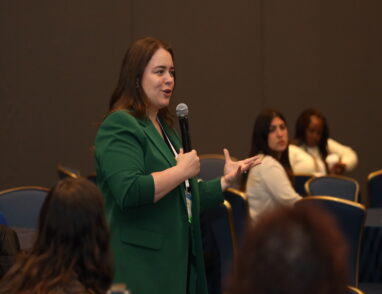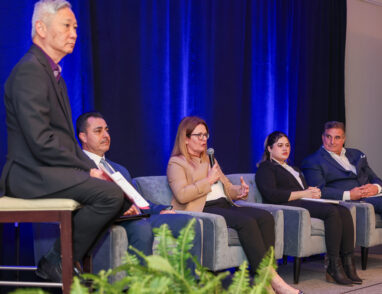Presentation Recap: NCQA Finds Trends in Timely Follow-Up After Hospitalization
June 17, 2021 · NCQA Communications
COVID-19 presented many challenges for medical professionals when providing care to patients – including discharge timely follow-up visits after hospitalizations but with telehealth, some of the care that usually took place in-person could now take place virtually.
 CARES Act Telehealth Expansion: Trends in Post-Discharge Follow-up After HRRP Hospitalization and Association with 30-Day Readmissions, a recent study among Medicare patients led by NCQA Research Scientist Dr. Carrie Mills, looked at trends patterns in telehealth use during COVID-19 to see if there were disparities in who had access to telehealth as a health care option. The researchers also explored the association between type of follow-up and hospital readmissions.
CARES Act Telehealth Expansion: Trends in Post-Discharge Follow-up After HRRP Hospitalization and Association with 30-Day Readmissions, a recent study among Medicare patients led by NCQA Research Scientist Dr. Carrie Mills, looked at trends patterns in telehealth use during COVID-19 to see if there were disparities in who had access to telehealth as a health care option. The researchers also explored the association between type of follow-up and hospital readmissions.
With a change to telehealth regulations in March 2020 in response to the pandemic, over half of timely follow-up visits after hospitalizations were by telehealth (54% in April 2020). Use of telehealth decreased throughout the study period, and was 18% of follow-up in September 2020. Rates of telehealth in 2020 were still high compared to 2019 (telehealth accounted for 0.1% of follow-up , in 2019).
Telehealth use also varied by patients’ characteristics, with some historically underserved populations utilizing telehealth more often. Telehealth was used more often for follow-up persons with Medicare/Medicaid dual insurance, racial and ethnic minorities, and those living in socially deprived areas.
Findings suggested that hospital readmissions were lower when telehealth follow-up was used than if no follow-up occurred, though readmissions were lowest when in-person follow-up was used. These findings suggest that telehealth may help prevent readmissions and reducing disparities among patient who were hospitalized.
To learn more, see the poster for Trends in Timely Follow-up after Hospitalization, Adoption of Telehealth, and Association with 30-Day Readmission: Impact of the COVID-19 Public Health Emergency.
This study was one four reports NCQA staff presented at the AcademyHealth Annual Research Meeting on June 15, 2021. Others were:
- Predictors of Chronic Pain Diagnosis and Treatment Among Adult Federally Qualified Health Center Patients
- Access to Medications for Opioid Use Disorder Among Medicare Fee-for-Service Beneficiaries: Where Are the Gaps?
- COVID-19 Disrupted Skilled Nursing Facility Utilization and Outcomes across Medicare Advantage Enrollee Subgroups
- Quality of Preventive and Chronic Care for Insured Adults with Opioid Use Disorder
The primary source of funding for this study was from the Centers for Medicare and Medicaid Services.








